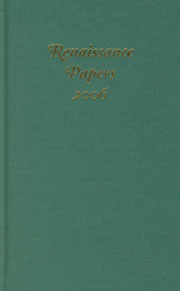Book contents
- Frontmatter
- Contents
- Renaissance Papers
- Youthes Witte: An Unstudied Elizabethan Anthology of Printed Verse and Prose Fiction
- The Power of Association: A Study in the Legitimization of Bianca Cappello through Medici Matriarchal Portraiture
- Vindicta and Vindiciae on the Early English Stage: Imagining Revenge through Huguenot Resistance Theory
- Breaking the Head of the Serpent: Women's Childbirth Prayers in The Monument of Matrones
- “Conquered nations mean nothing in love”: Political Dissent in Propertius's Elegy II.7 and Donne's “Love's Warre”
- Correcting Double Vision in The Comedy of Errors
- Lear's Awakening: Texts and Contexts
- The Power of Fantasy in Middleton's Chaste Maid: A Cost/Benefit Analysis
- Invariant Paratexts in English Dramatic Texts
- Milton and Forgiveness
- Samson at the Fair
- The End of Samson Agonistes
Breaking the Head of the Serpent: Women's Childbirth Prayers in The Monument of Matrones
Published online by Cambridge University Press: 12 September 2012
- Frontmatter
- Contents
- Renaissance Papers
- Youthes Witte: An Unstudied Elizabethan Anthology of Printed Verse and Prose Fiction
- The Power of Association: A Study in the Legitimization of Bianca Cappello through Medici Matriarchal Portraiture
- Vindicta and Vindiciae on the Early English Stage: Imagining Revenge through Huguenot Resistance Theory
- Breaking the Head of the Serpent: Women's Childbirth Prayers in The Monument of Matrones
- “Conquered nations mean nothing in love”: Political Dissent in Propertius's Elegy II.7 and Donne's “Love's Warre”
- Correcting Double Vision in The Comedy of Errors
- Lear's Awakening: Texts and Contexts
- The Power of Fantasy in Middleton's Chaste Maid: A Cost/Benefit Analysis
- Invariant Paratexts in English Dramatic Texts
- Milton and Forgiveness
- Samson at the Fair
- The End of Samson Agonistes
Summary
Two punishmentes are laid vpon [women], to witte, a dolor, anguishe and payn, as oft as euer she shal be mother: and a subiection of her selfe, her appetites and will, to her husband, and to his will. Frome the former parte of this malediction can nether arte, nobilitie, policie, nor lawe made by man, deliuer womankinde, but who soeuer atteineth to that honour to be mother, proueth in experience the effect and strength of goddes word.
I BEGIN with John Knox's famous assessment of motherhood because it vividly encapsulates the contradictions inherent in early modern constructions of maternity. Woman's punishment as a daughter of Eve required her suffering in childbirth and justified her subservience to her husband, but motherhood was also a source of redemption. An “honour” that confirmed God's strength, maternity proved to be a “site where a form of female authority that exceeds the domestic and redeems the curse of Eve intersects with a tradition of apocalyptic hope, gentle iconoclasm, and moderate Puritan dissent,” in the words of Catherine Gray.
Unfortunately, besides a few diary entries and letters, we have very little record of women's specific experience of motherhood, particularly of pregnancy and childbirth. Since men were not allowed in the birthing room and yet were writing most of the books on midwifery, we have very little material recounting women's own childbirth experiences. Although conduct manuals prescribe motherly behavior and mother's advice books offer a public expression of solicitude and sometimes even political authority, they provide very little description of the actual events of pregnancy.
- Type
- Chapter
- Information
- Renaissance Papers 2006 , pp. 61 - 76Publisher: Boydell & BrewerPrint publication year: 2007



